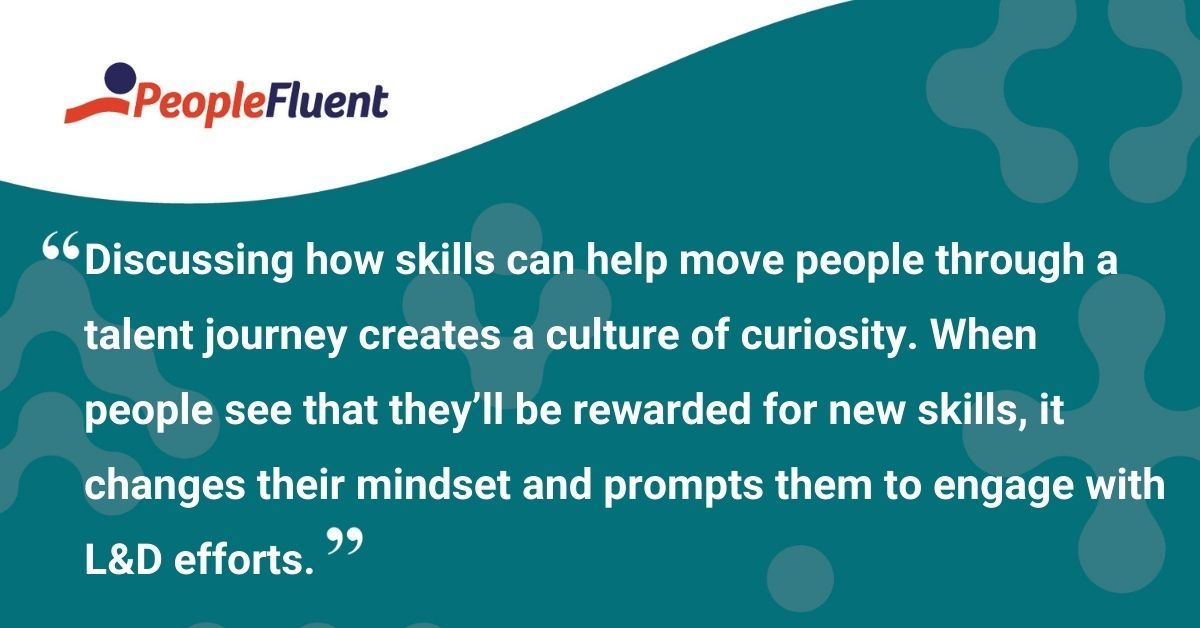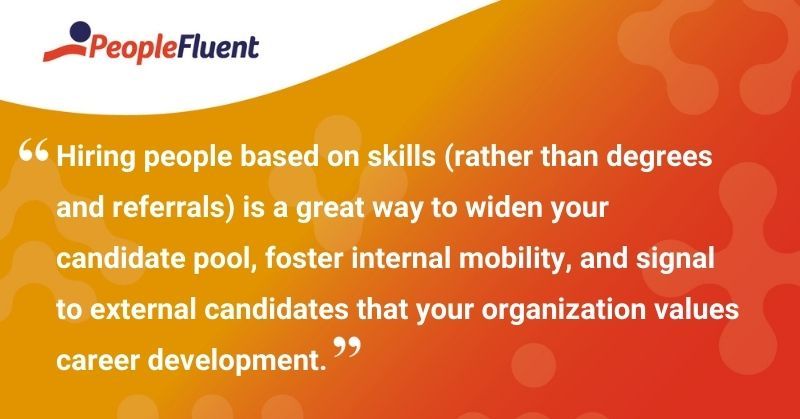Published: Jun 22, 2021Time to read: 5mins Category: Insights
The Shift From Degree-Based to Skills-Based Hiring: How L&D Can Help
In a recent webinar, ‘Shifting to a Skills-Based Workforce’, Dawn Baron, Director of Marketing at PeopleFluent, sat down (virtually) with Michael Brickman, Principal at Sheer Partners (and former policy official at the U.S. Department of Education). The pair shared insights into how L&D and recruitment teams can develop new processes to influence a big trend in the workplace: the shift to skills-based hiring.
With so much change happening in the workplace, now’s your chance, learning teams, to make a strong business case for L&D overhaul.
For years, analysts and company leaders have discussed the importance of reskilling and upskilling as a way to keep up with digitization in the workplace. Companies have now realized the organizational benefits of gaining visibility into the skills and competencies of their people.
Even in 2018, household names like Google and Apple recognized the need to shift to skills-based hiring. Jump forward a few years and the pandemic has accelerated this trend as organizations worldwide examine how they hire, upskill, and reskill employees.
We’re now seeing a trend taking shape as more companies discuss skills-based hiring. Keep reading to learn more about what that is and how it could affect the recruitment space. Plus, tips on how you can get ready for the changes.
RELATED CONTENT | ‘Upskilling vs. Reskilling: Understanding the Differences and Their Role in Talent Mobility’
How Can a Skills Discussion Change Behavior?
For starters, it’s important to have a clear link between skills conversations and HR tech. It helps leaders deploy, track, and measure how compensation and rewards are tied to learning initiatives.
This link gives people managers a way to connect the dots between recruiting, learning, compensation, and succession. Best of all, discussing how skills can help move people through a talent journey creates a culture of curiosity. When people see that they’ll be rewarded for obtaining new skills, it changes their mindset and prompts them to engage with L&D efforts.
For HR pros, it helps to have a deeper insight into the company’s unique hiring needs. Why? Because this kind of data helps leaders better prepare for growth and make informed recruiting decisions. These conversations are equally important for identifying skills gaps and strengths in your organization.

YOU MIGHT ALSO LIKE | ‘Employee Experience: How to Manage Before Day One… and Beyond’
Skills-Based vs Degree-Based Hiring
The number of jobs that require a Bachelor’s degree has grown, regardless of the specialty. This has led to degree inflation—another pain point for the current hiring challenges. Keep in mind that global staffing is a $500 billion industry. Companies are taking longer and spending more money to hire. Even though the job and pay don’t change dramatically, the education requirements do.
It’s sometimes said that landing a job is all about who you know. LinkedIn suggests that candidates who get a referral from a connection are 9x more likely to get hired. But, this doesn’t mean a recruiter or hiring manager will get the best talent available. Nor will they see a diverse group of applicants if they only rely on candidate referrals from existing employees. That said, hiring managers should also be considering candidates based on what they know.
Hiring people based on skills (rather than degrees and referrals) is a great way to widen your candidate pool, foster internal mobility, and signal to external candidates that your organization values career development.

KEEP READING | ‘Recruitment After the Pandemic: A Major Opportunity for Improvement’
Common Barriers to Skills-Based Hiring
Of course, there will be barriers when asking managers to consider candidates based on skills—rather than simply being degree-focused. Here are some reasons people might not be adapting to a skills-based hiring mindset:
- It’s become a catch 22: hiring managers may look at other requirements—aside from a degree. Yet, few people possess these non-degree credentials. Applicants don’t have them because they don’t lead to a job on their own.
- CEOs are not on the same page as Chief People Officers or other leaders in the organization. It’s difficult to decide on a process, or even how to start the process when lacking this alignment.
- The company may admittedly not have a culture of inclusion that will set up alternative candidates for success so instead, they opt for “traditional” hires.
Though companies want to hire based on skills, they often can’t find candidates with the necessary skills. Worse yet, leaders can’t figure out a way to start the process of shifting from degree-based to skills-based hiring.
Although candidates might possess the desired skills and competencies, hiring managers have no way to verify this due to informal learning. Nowadays, people can learn how to code websites or graphic design on YouTube. A candidate could have certifications from non-accredited learning institutions that are only recognized within a specific space.
The best way to fix these challenges involves a combination of HR tech and strategy that includes:
- Collaboration from recruiting, learning, talent management, and compensation executives within the organization,
- And technologies from those same disciplines that know how to work with each other and share relevant employee information.
Leaders at the top need to find ways to work with middle managers as well as L&D teams to identify a path toward skills-based hiring. To get started with a good plan, though, they need the right data to inform processes.
When used together, PeopleFluent solutions can help your organization get prepared for the shift toward skills-based hiring, increase internal talent mobility, and optimize your learning programs.
See how the skills conversation can be brought to life with PeopleFluent technology.
For more insights, read our latest ebook, ‘Learning Is the Engine for Talent Mobility; Skills Are the Fuel’ from a recent collaboration with the Brandon Hall Group.